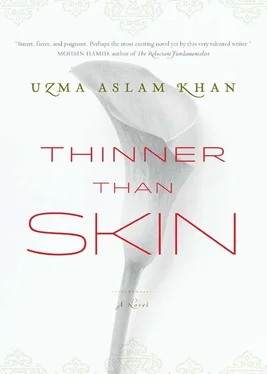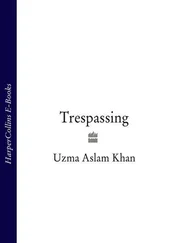By the end of that same year, Ghafoor was far from Kashgar and Chinese tanks and Han donkey carts and the man to whom he had promised aid. The news was still at his back, and it could still be heard. The East Turkestan separatist had been executed.
His brother was now sitting opposite Ghafoor, without toes, and with a box. Ah — Ghafoor had not been able to place him, but the man now came out with his name! He need not have shown Ghafoor the photographs of those lovely mosques that would soon be razed. Of course Ghafoor had seen them, with his own eyes, before moving on from Kashgar into Kazakhstan. He had seen the military parade double in might, the fighter jets that spewed ribbons of white smoke into a sky that would not wear its natural color again for weeks. But by then, Ghafoor did not really care. Somewhere between the kebabs on bicycle spokes and the Chinese yuan in his pockets — or perhaps between the military tanks and an old man’s defiance — he had fallen in love with a girl so white she could be a ribbon herself. She certainly weaved around him like one, her face a smooth oval, her lips small and pink, and with just the tiniest smile lurking at one corner. In one of those labyrinthine alleys in a photograph in a soft leather palm, he had followed her, over the remaining cobblestones and into a doorway and up a staircase and behind a madressah where her father was preaching, and on, into another doorway, up another staircase, through a window patterned with green tiles that took his breath away, on, past the blue and white vase standing on a pillar that was surely a work of angels. And there she pulled him into a room high above the minarets that seemed to point at the fighter jets, cursing them to hell. And she weaved around him again.
They met there each day, in a room in a sky in which birds had not flown for longer than anyone could say. They simply sat, the nightingales and the doves, the eagles and even the grayleg geese, on the eaves of houses and the domes of mosques, waiting for the planes to stop their din, waiting to be swept by the breezes that had also stopped, waiting, waiting, for the People’s Liberation Army to look somewhere else, because it was getting late, soon, many of them would have to migrate south, including to Kaghan Valley, where he, the tall man with the sideburns and the belt on the floor, had once made his home. But in the meantime, while they waited, at least they had the advantage of a bird’s eye view of the lovers who met each day in that room.
She wanted him to stay but he could not stay. He told her he had goods to trade in the steppe. He promised he would be back. He said her thigh was like the inside of a dove’s wing, silken smooth and silken white, and outside, the doves shifted and almost cooed.
He was getting good at getting naked faster than her old man could climb one-third of the way up the stairs. Another third, and he had already had his fill. The final third, they had both dressed, and parted. By the time the midday prayer sounded from all the mosques — even the heavenly call from a hundred majestic minarets could not rival the din of the fighter jets, though not for want of trying; many muezzins lost their voices permanently that summer — the man with the sideburns and the girl with the feather-smooth thighs were nowhere to be seen.
And now, four summers later, the two Uyghurs had brought him what he asked. He opened the box. Two flowers, still fresh. The choice he faced was not easy, but it was worth trying to avoid. He paid them generously and stood up to leave. They laughed, reminding him that though he might prefer otherwise, their business was not over.
He sat back down.
After leaving the girl in Kashgar, his world had kept opening. He traded in the cities of Tashkent, Samarkand, Bukhara, and Almaty, traveling up the Oxus River and deep into the steppe, developing a special kinship with those who built the goods he sold in the markets. It was here the land spoke to him most, in a region that lay high in the north of what was now Kazakhstan, though to the nomads with whom he was to spend the next three summers, all of Central Asia was one land, divided not into states but into mountain and steppe, desert and oasis. The steppe nomads made him feel he was looking back in time —his time. It was the strangest sensation, the first day he was invited to break bread with them. It was as though a mountain inside him were melting, leaving him naked and cleansed, entirely in his own skin, the skin he used to inhabit in the valley of his youth, before he had to leave (he had not entirely chosen to leave; he had been sent away, banished, almost, even if he did prefer to think otherwise), before he had to don a thousand different skins. In the steppe he was undisguised, unwary, unwanting.
He found that the Turkic nomads shared an uncanny likeness to his own community: love of horses, hospitality to guests, and, most of all, a worshipful knowledge of the primacy of movement. The men had lush beards and liked their trees to look the same; they did not fell that which gave them life. Even some of their festivals were the same. They observed Nauroz, the first day of spring, by cleansing their homes with burning juniper branches, smoking out the vices of the previous year, a ritual now done in secret down in Kaghan, by a woman who, when she was a child, had licked honey from his fingers and danced to his flute. (The memory always made him smile.) The steppe nomads loved music too, bowed string things that made them kick. He was glad he had his flute. They sang as much as they prayed, and talked twice as much. They had their own shamans, those who could escort a soul back to a body, and those who could escort due justice back to a crime. They were born with a long ear and a memory as old as the Oxus. So was he. There was nothing said in his presence that he did not carry deep in his chest to the next yurt, the next town, the next valley. But he held it there. He did not talk. He merely listened, loyal to everyone who showed him only kindness. Their stories were his stories. Their enemies were his enemies. And their women, well.
Only a few weeks after leaving the girl with the feather-white thighs, Ghafoor found himself drinking milk from the arms of another. They had a peculiar diet, up here. It was the hardest thing for him to grow accustomed to. The worst thing he ever ate was a bowl of thick string made of something vaguely the consistency of rice, though the duck, also new to him, did make it easier to swallow, and the mare’s milk made it easier still. He had never milked even a buffalo before — a sign that he was never a very good herder, even when he was one — but one day he saw her doing it, stroking the udder of a visibly pregnant mare, a girl who was not slight and not oval-faced, but who had the most perfect round arms, and who showed him how. Press like this .
Over the course of the summer he followed her through highland pastures the way he had, not too long ago, followed another through cobblestone labyrinths. An audience of eagles and hawks dipped and twirled in a sky free of fighter jets. Looking up from beneath him in the grass, she spoke a name of God that was older than Allah. Tengri . Tengri, he repeated, drinking her smell. He was getting better at getting naked faster than the milk still warm on her flesh could ferment. Tengri , she whispered again and again in his ear. It means the endless hemisphere of the sky .
There was some movement that even a free woman did not consider free. This time, before he could leave for the market towns, he was told to bid for her hand, which he did. He won the hand but before he could marry her, he had to win at two additional tasks. The first was assembling their home. A yurt was more luxurious than any Gujjar tent, and entirely sacred. It was a replica of the endless hemisphere of the sky and putting it together was an act of creation. His bride-to-be needed to know that he could create. After many tries, he eventually succeeded. Their yurt was a bright, plush home, with each aspect, she told him, representing a part of the human body. The walls were thighs, the smoke hole the eye, and the interior lattice frame with the ribbed plates that he gazed upon each night from beneath her, the womb. The second task was not divine, though, much to her amusement, he did not realize this till much later, when it ceased being a prerequisite to their marriage. It was a game in which he waited on a sandy outcrop on a horse till she rode up to him, at which point, he could chase after her. If he caught up with her, he could kiss her. If he failed, she could whip him. The game even had a name, kyz kuu, the kissing game. He never did win, even before she took pity and married him.
Читать дальше












